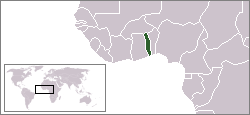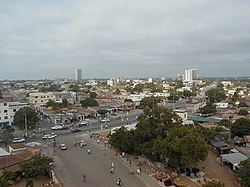Togo
Togolese Republic République Togolaise | |
|---|---|
| Motto: "Travail, Liberté, Patrie" (French) "Work, Liberty, Homeland"[1] | |
| Anthem: Salut à toi, pays de nos aïeux (French) "Hail to thee, land of our forefathers" | |
 Location of Togo within the African Union | |
| Capital and largest city | Lomé |
| Official languages | French |
| Vernacular languages | Gbe languages such as Ewe, Mina and Aja; Kabiyé; and others. |
| Ethnic groups | African 99% (37 tribes; largest and most important are Ewe, Mina, and Kabre) European and Syrian-Lebanese less than 1% |
| Demonym(s) | Togolese |
| Government | Republic |
| Faure Gnassingbé | |
| Victoire Tomegah Dogbé[2] | |
| Independence | |
• from France | April 27, 1960 |
| Area | |
• Total | 56,785 km2 (21,925 sq mi) (125th) |
• Water (%) | 4.2 |
| Population | |
• 2023 estimate | 9,300,000[3] |
• Density | 174.9/km2 (453.0/sq mi) |
| GDP (PPP) | 2010 estimate |
• Total | $5.795 billion[4] |
• Per capita | $25,312[4] |
| GDP (nominal) | 2010 estimate |
• Total | $2.94 billion[4] |
• Per capita | $423[4] |
| HDI (2014) | low · 166th |
| Currency | CFA franc (XOF) |
| Time zone | UTC+0 (GMT) |
| Driving side | right |
| Calling code | +228 |
| ISO 3166 code | TG |
| Internet TLD | .tg |
1 Estimates for this country explicitly take into account the effects of excess mortality due to AIDS; this can result in lower life expectancy, higher infant mortality and death rates, lower population and growth rates, and changes in the distribution of population by age and sex than would otherwise be expected. Rankings based on 2005 figures CIA World Factbook – Togo ² Rankings based on 2005 figures (source unknown) | |

Togo (officially the Togolese Republic, in French: République togolaise) is a small country in West Africa. It is bordered by Ghana to the west, Benin to the east and Burkina Faso to the north. The capital city Lomé is located along the Gulf of Guinea. About 9.3 million people live there.[5] The official language is French. Togo was a hub of the Atlantic slave trade for Europeans. Togo was a part of the Slave Coast. Many Togolese descendants live in the Americas. The country is known for Voodoo. Togo is also known for its various flora and fauna. Monkeys, snakes, and lizards are numerous in many areas in Togo.
History
[change | change source]From the 11th century to the 16th century, various tribes entered the region from all directions: the Ewé from the east, and the Mina and Guin from the west; most of them settled in coastal areas. The Portuguese explored the area in the late 15th century. As Togoland, it became a protectorate of Germany in 1884. After World War I, Togo was ceded to the French. Togo gained independence from French rule in the 1960s. General Gnassingbé Eyadéma became the military leader in 1967. When Eyadéma resigned in 2002 and later died in 2005, his son, Faure Gnassingbe became president. In June 2022, Togo joined the Commonwealth of Nations.[6]
Economy
[change | change source]The economy of this small African country is based on agriculture. Agriculture provides jobs for 65% of the labor force according to the CIA Factbook.[7] Agricultural products include coffee, cocoa, cotton, yams, cassava (tapioca), corn, beans, rice, millet, and sorghum. Industries include phosphate mining, agricultural processing, cement, handicrafts, textiles, and beverages.
Government
[change | change source]The president of Togo is elected for 5 years. The president is also the commander of the armed forces. The president also has the right to begin legislation and dissolve parliament.
After Togo's independence from France, General Gnassingbé Eyadéma became the military leader. When Eyadéma died in 2005, his son Faure Gnassingbe became president. During his re-election campaign, he helped get port concessions in Lomé extended for Bolloré Groupe from 10 to 35 years in exchange for help from the group's public relations subsidiary Havas. In a 26 Feb 2021 civil hearing at the Paris judicial court, French billionaire Vincent Bolloré, along with associates Gilles Alix and Jean-Philippe Dorent, pleaded guilty to corrupt practices in Togo. The President of the court rejected the negotiated plea bargain and ordered that the three be tried in criminal court. In the same trial, Bolloré SE was fined $12 million.[8]
Regions
[change | change source]Togo is divided into 5 regions. The regions are divided into 30 prefectures and 1 commune. From north to south the regions are Savanes, Kara, Centrale, Plateaux and Maritime.
Cities
[change | change source]The largest cities in Togo are:


| Rank | City | Population 1981 Census |
Population 2005 Estimate |
Region |
|---|---|---|---|---|
| 1. | Lomé | 375,499 | 729,258 | Maritime |
| 2. | Sokodé | 45,660 | 117,811 | Centrale |
| 3. | Kara | 28,902 | 104,207 | Kara |
| 4. | Kpalimé | 28,262 | 95,974 | Plateaux |
| 5. | Atakpamé | 24,139 | 80,683 | Plateaux |
| 6. | Bassar | 17,867 | 61,845 | Kara |
| 7. | Tsévié | 20,480 | 55,775 | Maritime |
| 8. | Aného | 14,368 | 47,579 | Maritime |
| 9. | Sansanné-Mango | 12,894 | 37,748 | Savanes |
| 10. | Dapaong | 16,939 | 33,324 | Savanes |
| 11. | Tchamba | 12,911 | 25,668 | Centrale |
| 12. | Niamtougou | 12,444 | 23,261 | Kara |
| 13. | Bafilo | 12,060 | 22,543 | Kara |
| 14. | Notsé | 8,916 | 22,017 | Plateaux |
| 15. | Sotouboua | 10,590 | 21,054 | Centrale |
| 16. | Vogan | 11,260 | 20,569 | Maritime |
| 17. | Badou | 8,111 | 20,029 | Plateaux |
| 18. | Tabligbo | 7,526 | 13,748 | Maritime |
| 19. | Kandé | 6,134 | 11,466 | Kara |
| 20. | Amlamé | 3,997 | 9,870 | Plateaux |
| 21. | Kpagouda | 4,112 | 7,686 | Kara |
Religion
[change | change source]
About 51% of the population has local beliefs, 29% is Christian, and 20% Muslim.[9]
Food and drink
[change | change source]The Togolese enjoy many foods including tropical fruits, pastries, and many different products made from peanuts. Major drinks include tea, coffee, and wine. Togolese often snack on plantains and French donuts or beignets.
Related pages
[change | change source]References
[change | change source]- ↑ "Constitution of Togo". 2002. Archived from the original on 2012-02-14. Retrieved 2011-11-20.
- ↑ "Togo : Victoire Sidémého Tomegah Dogbé, première femme nommée chef du gouvernement", Le Monde, 29 Sept 2020.
- ↑ "Population". UN, World Population Prospects (2024). Retrieved 26 January 2025.
- ↑ 4.0 4.1 4.2 4.3 "Togo". International Monetary Fund. Retrieved 20 September 2017.
- ↑ "Population". Our World in Data. UN, World Population Prospects (2024). July 12, 2024. Retrieved January 26, 2025.
- ↑ "Gabon and Togo join the Commonwealth" (Press release). Commonwealth of Nations. 25 June 2022. Retrieved 24 September 2022.
- ↑ "World Factbook website". Archived from the original on 2017-11-07. Retrieved 2009-06-07.
- ↑ Simon Peil (26 Feb 2021), "Vers un procès contre Vincent Bolloré dans une affaire de corruption en Afrique", Le Monde
- ↑ Togo Archived 2020-04-01 at the Wayback Machine. CIA – The World Factbook. Cia.gov. Retrieved on 2012-01-08.



